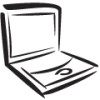Gateway M405 User Guide - Page 157
Changing power settings, Changing the power scheme
 |
View all Gateway M405 manuals
Add to My Manuals
Save this manual to your list of manuals |
Page 157 highlights
Changing power settings Changing power settings You can change the function of the power button, Standby system key, and power-saving timers by changing power settings on your notebook. You can customize power settings from the Windows Control Panel by selecting power schemes, setting power alarms, adjusting advanced power settings, and activating Hibernate mode. Power schemes (groups of power settings) let you change power saving options such as when the display or hard drive is automatically turned off. You can select one of the defined power schemes or create a custom power scheme. Important The processor installed in your notebook may use Intel® SpeedStep™ technology to conserve battery power. A SpeedStep-equipped processor can change its operating speed according to the power source. A SpeedStep-equipped notebook's default settings operate the processor at full speed while connected to AC power and at reduced speed (which uses less power) while using battery power. Power schemes also set the speed of an Intel® SpeedStep™-equipped processor in Windows XP. To change the SpeedStep settings in Windows 2000, see "Changing SpeedStep settings in Windows 2000" on page 153. Alarms can alert you when the battery charge is low. Advanced power settings let you assign different power saving modes to the power button and Standby system key. You can also select which power saving mode is activated when you close the LCD panel. Changing the power scheme To change the power scheme: 1 In Windows XP, click Start, then click Control Panel. The Control Panel window opens. If your Control Panel is in Category View, click Performance and Maintenance. - OR - In Windows 2000, click Start, Settings, then click Control Panel. The Control Panel window opens. www.gateway.com 147















